The three students all say they received mentorship and support from the Scott Scholars Program at UNO, and now as part of UNMC’s inaugural class
By Connie White
Ryan Chapman wants to help others, so he hopes someday to be an internal medicine physician or study infectious diseases.
Heather Richard feels drawn to pediatric hematology and oncology because she loves working with children.
Nour Elrokhsi is exploring a career as a primary care physician because she has personally witnessed how health care can change lives.
Chapman, Richard and Elrokhsi, all from the Omaha area, are medical students at the University of Nebraska Medical Center. All three say their interest in health care stems from a desire to make a difference in the world. And all three credit the Scott Scholars Program with providing mentorship and support to inspire their future health care careers.
The Suzanne & Walter Scott Foundation pledged $23 million to sustain and grow the prestigious Scott Scholars Program at the University of Nebraska at Omaha, where it was established by the late Omaha philanthropist Walter Scott, Jr. The gift commitment also supports an expansion of the program to UNMC, where 12 Scott Scholars began their first year of medical school in fall 2023.
Chapman, Richard and Elrokhsi all are graduates of the UNO Scott Scholars Program, launched in 1997 to help keep high-achieving STEM students in Nebraska. The three also are members of the inaugural class of Scott Scholars at UNMC.
Here are their stories:
Ryan Chapman
Chapman, who graduated from Skutt Catholic High School, said that when he arrived at UNO, he planned to become a computer programmer. Then he did a computer science internship with a local company between his freshman and sophomore years. He had a good experience but decided he wanted a career where he could make a more personal impact.
That fall, he enrolled in more science courses and volunteered for the Omaha VA Medical Center.
“I decided that I wanted a job where I’m able to directly work with and help other people,” he said. “I think the Scott Scholars Program helped me to think about it.”
He said his path to medical school was a direct result of leadership classes he took in the Scott Scholars Program, along with the mentorship of Harnoor Dhaliwal, Ph.D., and Wayne Watkins, the leaders of the program.
“The Scott Scholars Program has challenged me to think beyond what I imagined for myself and encouraged me to find a career where I can impact the lives of others,” Chapman said. “I know UNMC will train me to be a great physician.”
Heather Richard
Richard, who graduated from Bellevue West High School, said she has always been interested in the human body and science. Through volunteer opportunities and clinical experiences at UNO, she set a goal to become a physician.
“I have a profound desire to make an impact on patients’ lives,” Richard said.
She said the Scott Scholars Program provided her with a sense of community and made her UNO undergraduate experience enjoyable. Growing up, she was shy and introverted. The program’s leaders helped her step out of her shell and develop communication skills and grow her confidence. She also learned that there are different kinds of leaders.
“You can be a leader even if you’re more quiet and more introverted,” Richard said.
She recalled meeting Walter Scott, Jr., during a reception while a UNO student.
“I remember he treated us with kindness and with so much respect,” she said. “We were a part of his community and his family, in a way.”
After she finishes her training, Richard said, she hopes to practice medicine in Nebraska.
“My family is here,” she said. “I want to be involved in this community and serve Nebraska.”
Nour Elrokhsi
Elrokhsi, who graduated from Millard North High School, said she always knew she wanted to work in health care. Her parents are physicians, so she learned early on the power of health care to change lives.
“Medicine has been something I’ve been around my whole life,” she said.
Through the Scott Scholars Program, she worked with the Munroe-Meyer Institute to propose design ideas for its dental clinic. Working with a team of students that included Richard, the group offered ideas to make neurodivergent patients more comfortable, including adjustments to lighting, images on the projector screens, and even the texture on the exam chairs.
Elrokhsi said primary care is an umbrella term for a host of specialties, including pediatrics, internal medicine and family medicine. She said another area of interest is psychiatry.
“I like the personal aspects of these specialties,” she said. “You get to know your patients, and they become friends.”
She is “just incredibly grateful” for the scholarship assistance she has received through the Scott Scholars Program and for the mentorship and support.
“They believe in you more than you believe in yourself,” Elrokhsi said of the program’s leaders.
She sees herself staying in Nebraska after she completes her medical school training.
“Nebraska has grown on me,” said Elrokhsi, who was born in Libya. “UNMC is an incredible institution and to be able to do my medical training here is a privilege. To continue that here would be wonderful.”












